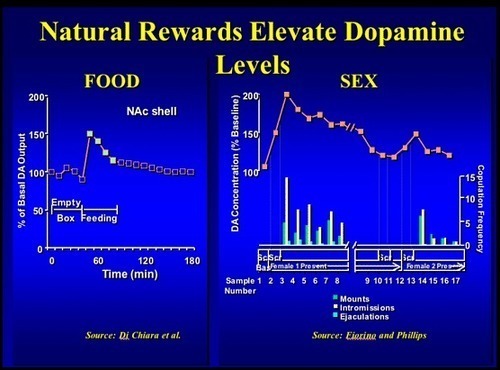What’s more likely to land you a job: a referral or just being good-looking?
you had to choose between one or the other, forget the referral and just be hot: There is a blend of various factors on which the hiring of employee is based upon. This paper investigates and interrogates the contribution of physical attractiveness and referrals in the hiring of employee and further ponders on which matters the most from the above outlined variables when an employee is hired. The findings of the paper clearly confirm that it is the physical…
1 min read
Does one orgasm equal two cheeseburgers?
proximately. When you measure the release of dopamine that food, sex and drugs cause you can roughly quantify the amount of pleasure each delivers. Via Frontline, slides by Richard Rawson: Methamphetamine effects the centers of the brain that control judgment, control reward, and control memory. The most important one probably are the reward centers of the brain. When, when that part of the brain is stimulated dopamine's released, and you experience that as pleasure. Under normal circumstances those responses occur…
2 minutes
4 Secrets To Becoming Luckier, According To Research
open to more opportunities, interact with a large network of people, break routines and keep a relaxed attitude toward life. Via Little Bets: How Breakthrough Ideas Emerge from Small Discoveries: ...lucky people pay more attention to what’s going on around them than unlucky people. It’s more nuanced than that. Here’s where being open to meeting, interacting with, and learning from different types of people comes in. Wiseman found that lucky people tend to be open to opportunities (or insights)…
3 minutes
Is it better to do all your reading for the year in two weeks?
y compressing their intake into a matter of days, they give new ideas additional opportunities to network among themselves, for the simple reason that it’s easier to remember something that you read yesterday than it is to remember something you read six months ago." Via Where Good Ideas Come From: The Natural History of Innovation: The problem with assimilating new ideas at the fringes of your daily routine is that the potential combinations are limited by the reach of your…
2 minutes
How are teenager’s brains similar to those of drug addicts?
alvan noted that the response pattern of teen brains is essentially the same response curve of a seasoned drug addict. Their reward center cannot be stimulated by low doses—they need the big jolt to get pleasure." Via NurtureShock: Is it possible that teens are just neurologically prone to boredom? According to the work of neuroscientist Dr. Adriana Galvan at UCLA, there’s good reason to think so. Inside our brains is a reward center, involving the nucleus accumbens, which lights up…
2 minutes
What’s the most important part of an athlete’s body?
t's all about the ass." Via ESPN (hat tip: Chris Yeh) The bulk of any athlete's power sits squarely in the gluteus maximus. Roughly three times the size of the biceps, it is the largest of the three gluteal muscles. It begins at the top of the pelvis (right near your rear pants pockets). Then it wraps around the bottom of the hip, where it connects to the front side of the femur. Besides giving the butt its girth, the…
2 minutes
Here’s the most powerful technique for following through on your dreams
"If-then" planning. Via Nine Things Successful People Do Differently: It’s called if-then planning, and it is a really powerful way to help you achieve any goal. Well over a hundred studies, on everything from diet and exercise to negotiation and time management, have shown that deciding in advance when and where you will take specific actions to reach your goal (e.g., “If it is 4 p.m., then I will return any phone calls I should return today”) can double or…
2 minutes
4 Scientific Steps To Facing Your Fears
his book The Courage Quotient: How Science Can Make You Braver, Robert Biswas-Diener shows how we can use science and research to be more brave. He explains that there are two factors to courage: Fear Willingness to act They can both go up or down. Courage = "Willingness to act" divided by "Fear." To increase bravery you must either: Reduce fear. Boost willingness to act. Do both of the above. What steps can we take in the moment to…
3 minutes







